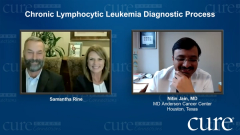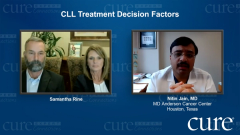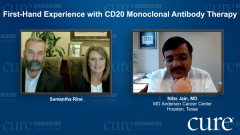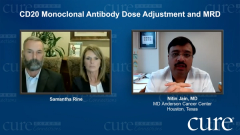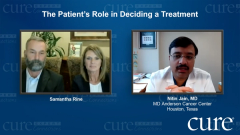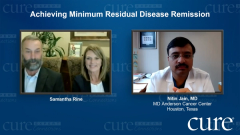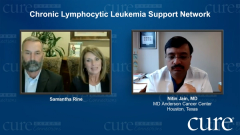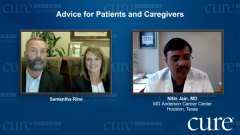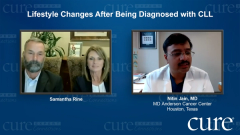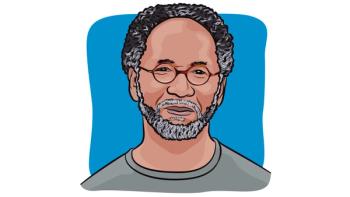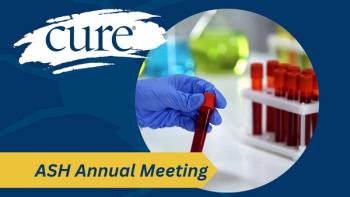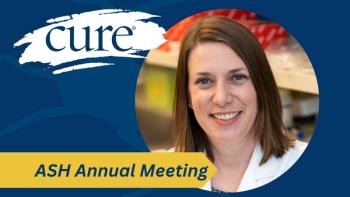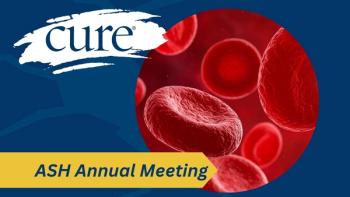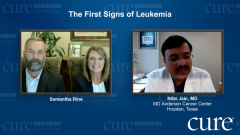
Advice for Patient's and Caregivers
Episodes in this series

Nitin Jain, MD: Doug, what advice do you have for friends and family members of patients with CLL [chronic lymphocytic leukemia]?
Doug Rine: The best advice is listening to the people who are most affected by it. You should try to understand what the patient is dealing with because unless you are that patient, you’re not going to understand it.
The patient is going to have a completely different mindset as to what’s going on. I looked at the situation very pragmatically and wanted to know the treatment and what the expected outcome may be. However, you also have the emotional side and the mental aspect of being the one diagnosed. You must step back and not be you for a while. You must try to be the person that you’re caring for and see things from their perspective. At times, the patient’s reaction isn’t what you theoretically may consider a logical reaction. Logic goes out the window when events like this come into your life. You can’t just look at things as a step-by-step process. You must put yourself in their position.
Additionally, you should look to bring in as many people as you can to help you gather the relevant information to help you present it. You may not always have the right answer, or you may not be able to reflect that answer in a way that gets through to the patient. Use the people who are in your life. Personally, we have a strong family and church in addition to friends we’ve known for a long time. If there’s something I need to get through to Samantha, and I can’t figure out how to do it, our friend can talk to Samantha in a way that I can’t. Use the people in your life when you need to get information or explain something differently. However, the biggest part is to listen, and do not make it about yourself. Ultimately, it is not about you at that time.
Nitin Jain, MD: What advice do you guys have for patients and caregivers who are listening? Once they’re diagnosed with CLL, what should they do? What final advice do you have on where should they go and what should they consider?
Samantha Rine: I would recommend going to a center or a provider that is an expert on CLL as that makes a huge difference. In our case, we have a good network where we live but not the best, hence why we travel to Houston to seek care. Additionally, pay attention to your body and the signs your body is showing you. CLL can be a hidden disease that may sneak up on you. In my case, in the months leading up to my diagnosis, my body was likely telling me that something was wrong with bruising and similar ailments. If you observe any kind of changes, go see a doctor to find out if anything is going on.
Primarily, a diagnosis of CLL is not necessarily bad news. It’s shocking news, and it’s somewhat life changing realizing you have a chronic illness, but it’s also not life changing as it’s not going to change your life extensively physically. Do not panic because there is help, and there are some great treatments. If you’re going to get a cancer diagnosis, this is not a bad one to get. I feel very blessed.
The year that I was being treated following the diagnosis, it has been one of the best things that’s ever happened to me. I’ve been the happiest I’ve ever been in my life because it was a blessing to be diagnosed and to have the support and treatment that we’ve experienced. If you are diagnosed, it’s not the end of the world, it’s the beginning.
Nitin Jain, MD: Doug, you have some points, too?
Doug Rine: It’s a negative when you get the diagnosis, especially one that it is chronic and will be with you. However, it can be a positive as it allows you the opportunity to focus on things that are important. The treatment, unlike some of the other chemotherapies and cancer treatments, is not something that physically drains you and leaves physiological effects that affect you on a day-to-day basis. Therefore, you’re able to go back to your life and continue to do things you do normally. For us, it helped to refocus on what was important. Specifically, that was the time we have together and being able to spend that time doing things that are meaningful. While the diagnosis is a negative and a life-changing event, it doesn’t necessarily have to change your life. You can continue to live your life. The biggest objective is be positive, because there are such wonderful treatments. Utilizing the right mindset and positive attitude, it’s something you can live with and come out stronger on the other side.
Transcript Edited for Clarity

